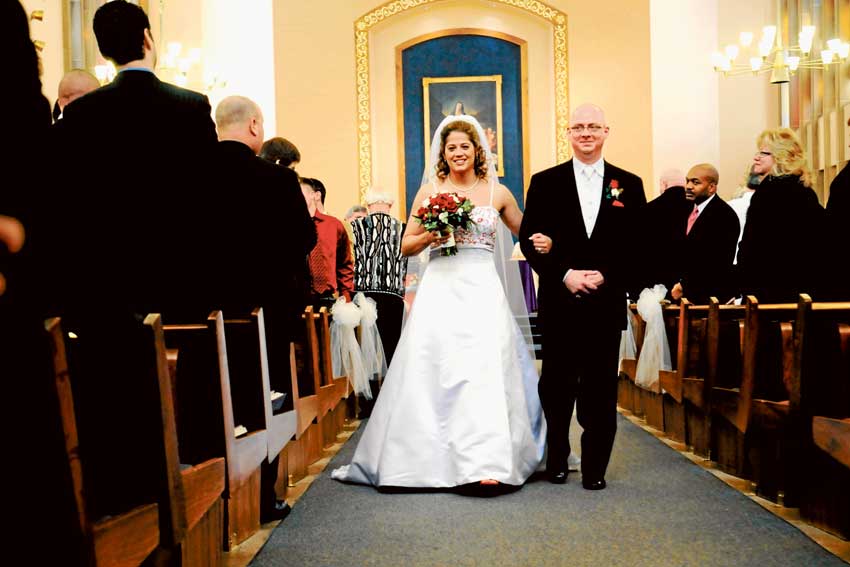
New Vatican document tackles ‘baptised nonbelievers’
Local Catholic leaders have welcomed a new document authorised by Pope Francis which highlights the need for greater formation of young people for marriage.
Written by the International Theological Commission, it said that a lack of faith and a misunderstanding of marriage can mean no sacramental marriage occurred, even if both the husband and wife had been baptised.
The document concludes that priests should not accept requests for a church wedding made by “baptised nonbelievers,” who clearly reject church teaching about the indissolubility and purpose of marriage.
The Commission, whose members are appointed by the pope, wrote The Reciprocity Between Faith and Sacraments in the Sacramental Economy in response to questions repeatedly raised since the 1970s and addressed by St John Paul II, Pope Benedict XVI and Pope Francis.
No sacraments without ‘living faith’
“The existence today of ‘baptised nonbelievers’ raises a new theological problem and a grave pastoral dilemma, especially when the lack of, or rather the rejection of, the faith seems clear,” the document said.
Commission members insisted that much greater care must be taken to educate Catholics in the meaning of faith, the significance of the sacraments and the meaning of marriage.
The Chancellor of the Archdiocese of Sydney, Chris Meney, welcomed the document saying that Catholic families have an important role to play in forming young people in an understanding of what Catholic marriage is and what it calls couples to do.
“Shaping an understanding of marriage which encompasses both its natural and sacramental realities and dimensions is properly a responsibility of the family,” Mr Meney told The Catholic Weekly.
A ‘landmark document’
Daniel Ang, director of the Archdiocese of Sydney’s Parish 2020 program, said the document, which also addresses other issues, was deeply important. “This is a landmark document that addresses a critical pastoral issue for our Church, including our parishes and schools,” he said.
“Faith is defined here as a personal relationship with God. What is more the document goes as far as to note that the sacraments make possible a personal relationship with the risen Lord and ‘have no meaning without such a relationship’.
“In short, it notes that we cannot look at the sacraments in isolation from a living faith or discipleship…. Unless people come to faith, come to relationship with Jesus, the likelihood that the sacraments will bear the fruit they are intended to bear is severely diminished.
“This includes the sacrament of baptism, the Eucharist, Christian marriage as well as ordination,” he said.
Co-director of the Marriage Resource Centre, Francine Pirola, said the commission articulates well the subtleties of the sacramentality of marriage, especially when one or both of the spouses is a non-believer, or a baptised non-believer.
“Canon lawyers and theologians are best equipped to answer how important is the faith of the recipients,” she said. “But what is apparent is that formation for the couple before and after the wedding can only be a positive.
“Many couples marry at a church rather than in the Church.”
By this we mean that the church is just a venue for the ceremony rather than a critical part of their commitment made in faith. They might be technically married, but they often don’t really embrace their vocational call to live a Catholic married lifestyle.
“Dating couples are wise to actively pursue their formation for marriage to assist them in their discernment – if there is serious issues to be addressed, it is always more complicated once a wedding date has been set.”
For this reason Mrs Pirola did not see the steep decline in the number of Catholic weddings in recent decades as necessarily a problem.
“Many couples seek a Catholic wedding for reasons that are not the best – for example, to appease parents, to conform to childhood fantasies of a church wedding, or to assist them in securing a place in a Catholic school for their children, or simply due to force of habit,” she said.
“Incentivising couples to marry in the church by making the preparation less demanding or relaxing our conditions may increase the number of Catholic weddings, but will it increase the number of couples who sincerely embrace their vocational call?”

The document did not claim to resolve completely the question of the validity of sacramental marriages in the absence of faith.
It also looked at the relationship between faith and the sacraments of baptism, confirmation and the Eucharist, and noted that complete or perfect faith is never requested for sacramental validity. Faith is something that is meant to grow.
Because the faith of the Church itself is at work in the sacraments, the Church has held that “the personal faith of the contracting parties does not constitute the sacramentality of matrimony.” But, at the same time, the document said, “the absence of personal faith compromises the validity of the sacrament.”
The question of validity has a practical impact on decisions of marriage tribunals when they are asked to grant a decree of nullity of a marriage. But, quoting Pope Francis and his predecessors, the document also noted another practical impact of the faith-sacrament relationship, which is the strength, love and commitment that sacramental grace gives a couple to live their vows.
The situations in which validity is called into question because of a lack of faith are limited, although increasing, the document said. It referred specifically to the marriages of ‘baptised nonbelievers’, a term first used by the theological commission in 1977.
“This category includes two types of people,” the document said: “Those who received baptism in infancy, but subsequently, for whatever reason, have not come to perform a personal act of faith involving their understanding and their will”; and “those baptised persons who consciously deny the faith explicitly and do not consider themselves to be Catholic or Christian believers.”
In updating rules for marriage tribunals in 2015, the commission noted, Pope Francis formally acknowledged that “the defect of faith” can be a motive for nullity.
Still, the document said, “as in every sacrament, in marriage there is a transmission of the grace of Christ. This grace is not due to the faith of the ministers,” which in the Latin-rite of the Catholic Church are the spouses, “but is a gift of Christ, who is actively present in the conjugal covenant, and of the Holy Spirit.”
Related articles:
This Catholic Life Podcast; Ep. 28: Marriage Is An Inside Job
This Catholic Life Podcast; Ep. 30: Marriage Is An Inside Job (Part 2)
Simcha Fisher: Three-year marriage preparation?
